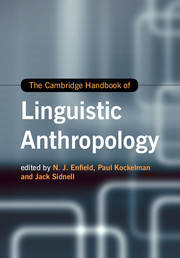Book contents
- The Cambridge Handbook of Linguistic Anthropology
- Series page
- The Cambridge Handbook of Linguistic Anthropology
- Copyright page
- Dedication
- Contents
- Figures
- Tables
- Contributors
- 1 Introduction
- Part I System and function
- 2 Basics of a language
- 3 The item/system problem
- 4 Language and the manual modality The communicative resilience of the human species
- 5 Linguistic diversityand universals
- 6 Denotation and the pragmatics of language
- 7 Language function
- Part II Process and formation
- Part III Interaction and intersubjectivity
- Part IV Community and social life
- Part V Interdisciplinary perspectives
- Index
5 - Linguistic diversityand universals
from Part I - System and function
Published online by Cambridge University Press: 05 October 2014
- The Cambridge Handbook of Linguistic Anthropology
- Series page
- The Cambridge Handbook of Linguistic Anthropology
- Copyright page
- Dedication
- Contents
- Figures
- Tables
- Contributors
- 1 Introduction
- Part I System and function
- 2 Basics of a language
- 3 The item/system problem
- 4 Language and the manual modality The communicative resilience of the human species
- 5 Linguistic diversityand universals
- 6 Denotation and the pragmatics of language
- 7 Language function
- Part II Process and formation
- Part III Interaction and intersubjectivity
- Part IV Community and social life
- Part V Interdisciplinary perspectives
- Index
Summary
- Type
- Chapter
- Information
- The Cambridge Handbook of Linguistic Anthropology , pp. 102 - 127Publisher: Cambridge University PressPrint publication year: 2014
- 10
- Cited by



